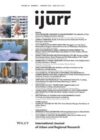Rules and order in urban construction, and thus the relationship between the market and the state, are a fundamental issue for urban development. In China, a transition economy, marketization has been actively promoted under the economic reforms to replace central‐planning and has contributed significantly to the subsequent dynamic urban growth. However, the role of the state in defining an institutional framework for the market is lagging behind. Fiscal deficiency in conjunction with a pro‐growth position undermines the capacity of the local developmental state to exercise effective developmental controls. Without effective state enforcement of rules, market order does not emerge when uncertainty pervades the marketplace. The phenomenon of urban villages and the case of Luohu’s redevelopment clearly show that the absence of the state both in constructing the market and as a third‐party gives rise to the logic of the commons or quasi‐commons in the land development market. Inferior and suboptimal developments ensue.
Details
Written by:
Jieming Zhu
Digital Object Identifier (DOI)
10.1111/j.0309-1317.2004.00527.x
About DOI
Read full article as PDF
Read full article as HTML
See the references for this article
